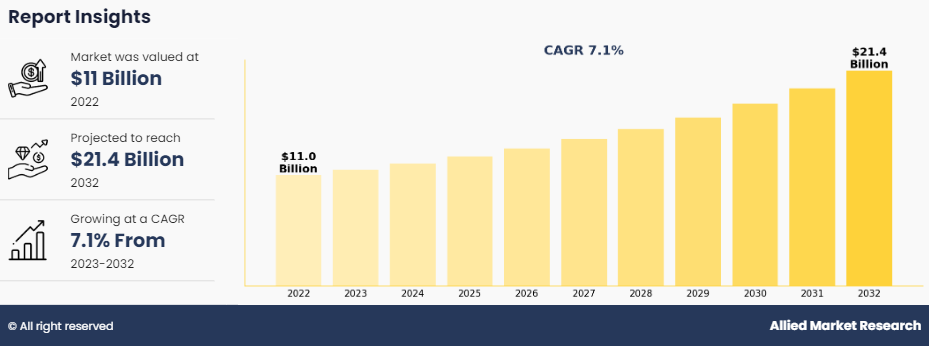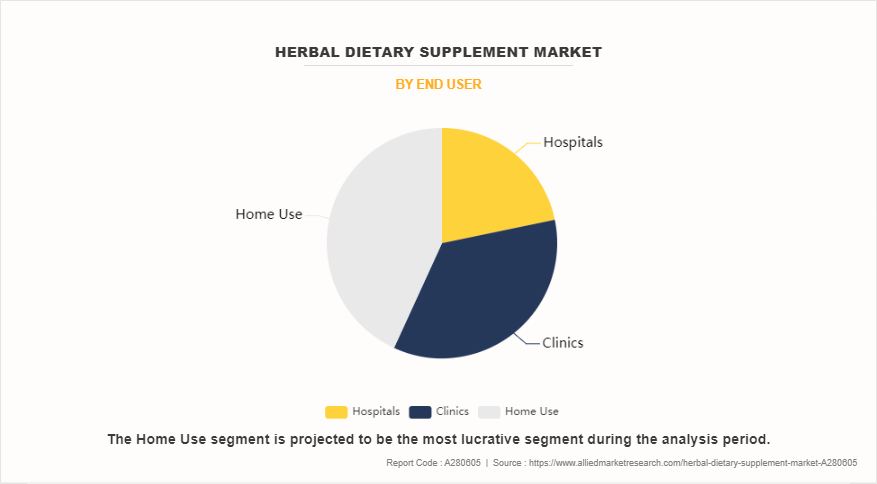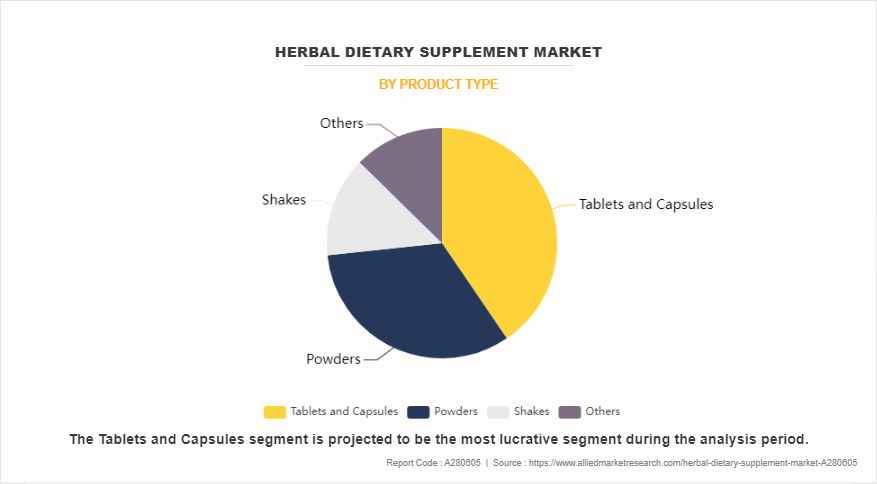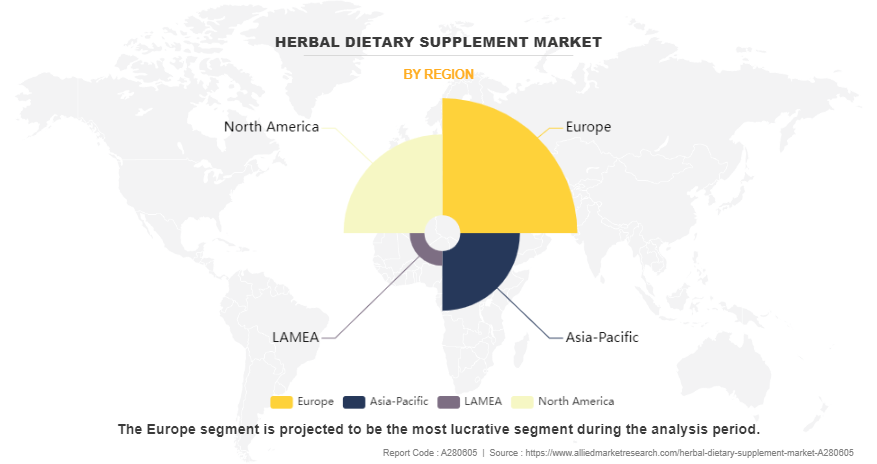Herbal Dietary Supplement Market Research, 2032
The global herbal dietary supplement market size was valued at $11 billion in 2022, and is projected to reach $21.4 billion by 2032, growing at a CAGR of 7.1% from 2023 to 2032.
A natural plant-based supplement refers to a dietary product derived from plants, including components like flowers, leaves, roots, or seeds, and is consumed orally for medicinal purposes. Falling within the category of dietary supplements, these natural supplements are commonly known as herbal dietary supplements. Unlike pharmaceutical drugs, they are labeled and marketed as 'herbals,' 'herbal products,' 'herbal medicines,' or 'herbal remedies.' Moreover, these supplements are not meant to replace a well-balanced diet, and they are subject to different regulatory standards compared to over the counter (OTC) and prescribed medications, undergoing less stringent testing by the Food and Drug Administration (FDA).

Key Takeaways
- By product type, the tablets & capsules segment emerged as the global leader in 2022 and the powders segment is anticipated to be the fastest growing during the forecast period.
- By end user, the home use segment emerged as the global leader in 2022 and is predicted to show the fastest growth in the upcoming years.
- Region-wise, North America registered the highest market share in 2022 and Europe is anticipated to generate the maximum revenue during the forecast period.
Segment Overview
The herbal dietary supplement market is segmented into End User and Product Type.

By end user, the home use segment dominated the global herbal dietary supplement industry share in 2022. The powders sub-segment is expected to experience significant growth, propelled by the versatility and personalization it brings to the herbal dietary supplement market. Consumers are increasingly drawn to powders as they offer a flexible and customizable approach to wellness. Herbal supplement powders can be easily incorporated into a variety of beverages, such as smoothies or teas, allowing individuals to tailor their consumption based on taste preferences and health goals.

By product type, the tablets & capsules segment dominated the global herbal dietary supplement market share in 2022. Tablets and capsules have emerged as preferred forms for the consumption of herbal dietary supplements due to their convenience, precision in dosing, and ease of incorporation into daily routines. The familiar and standardized form factor of tablets and capsules enhances consumer acceptance and ease of consumption, contributing to their dominance in the herbal dietary supplementmarket.
This segment's dominance can be attributed to the perceived advantages of tablets and capsules, such as controlled release of supplements, allowing for better absorption by the body. The ease of storage, portability, and accurate dosage measurement further contribute to the popularity of tablets and capsules among consumers seeking herbal dietary supplement market growth.

By region, Europe is predicted to be the fastest growing during the forecast period. Europe's herbal dietary supplement market is characterized by dynamic market dynamics and evolving consumer preferences. As a significant portion of the population incorporates one or more dietary supplements into their daily regimen, herbal products, including vitamins, minerals, and botanicals, play a crucial role. The market offers a range of formulations, adapting to the diverse preferences of consumers seeking natural and plant-based solutions.
The availability of supplements without prescription, typically in pill, powder, or liquid form, aligns with the convenience and health-conscious choices of the European populace. With a keen focus on preventive health measures, the herbal dietary supplement market in Europe stands as a vibrant and responsive sector, reflecting the continent's inclination towards embracing holistic approaches to health and wellness.
Competitive Analysis
The key players profiled in herbal dietary supplement market forecast report include Rainbow Light, Nature's Way, Swanson, Pure Essence, Jarrow Formulas, GNC, Nature's Sunshine, Pharmavite, Amway, and Herbalife. Acquisition and strategic partnership are common strategies followed by major market players. For instance, in January 2021, Prorganiq launched a new range of premium herbal supplements, aiming to provide pure and potent solutions to enhance people's overall health and assist them in building a better body through all-natural means. The focus of the launch was on offering high-quality herbal supplements to support individuals on their wellness journey.
Market Dynamics
Currently, individuals globally are seeking more natural alternatives for addressing various health conditions and enhancing overall well-being. This has led to a global surge in the consumption of herbal supplements, resulting in substantial revenue generation. Rise in adoption of these herbal products is deeply rooted in the traditional use of medicinal plants for preventing and treating diseases, a practice prevalent in diverse cultures. Despite being acknowledged by the World Health Organization (WHO) as a vital component of healthcare, concerns are growing regarding the quality and safety of herbal products.
Unlike pharmaceuticals, herbal products are generally not subject to strict regulations, often falling under the category of dietary supplements, allowing them to evade the rigorous scrutiny applied to pharmaceuticals. While many consumers perceive herbal products as benign and inherently safe, various reports highlight the potential for these products to cause mild to severe adverse effects of clinical significance. In addition, there have been instances of contamination in the herbal dietary supplement market demand, with herbal products found to contain microorganisms, environmental toxins, and adulterants. Moreover, the available evidence regarding the efficacy of herbal supplements remains highly inconsistent.
Contrary to vitamins and minerals, the efficacy of plant-based herbal products remains inconsistent, often lacking substantial supporting data. In addition, the regulatory standards for herbal products are less stringent compared to conventional drugs and vitamins. Depending on the country's legislation, these products fall under various descriptions such as traditional medicines, herbal medicines, natural health products, dietary supplements, contributing to inadequate global regulation.
This diversity raises concerns about the quality, safety, and efficacy of herbal products, which lack standardized preparation and can vary in consistency, constituents, and efficacy between batches and manufacturers. Environmental factors and cultivation conditions further impact the composition of phytochemicals, introducing variability.
Herbal medicine has been cultivated by various cultures for thousands of years, predominantly in Eastern countries and Africa, where it plays a crucial role in traditional medical systems. While the Western world has traditionally limited the use of herbal products to addressing minor ailments, recent advancements in wealth and living standards have led to increased investments in healthcare. Consequently, there is now a global surge in the use of herbal products for preventive and therapeutic purposes, with varying degrees of recognition across different regions.
In Asia and Africa, herbal medicine coexists harmoniously with modern medical practices, acting as a complementary or alternative therapy. However, regions such as Europe and the U.S. witness tension between traditional and modern approaches. However, there is a growing integration of complementary and alternative therapies in Western healthcare systems, reflecting a shift in patient preferences.
Key Benefits For Stakeholders
- This report provides a quantitative analysis of the market segments, current trends, estimations, and dynamics of the herbal dietary supplement market analysis from 2022 to 2032 to identify the prevailing herbal dietary supplement market opportunities.
- The market research is offered along with information related to key drivers, restraints, and opportunities.
- Porter's five forces analysis highlights the potency of buyers and suppliers to enable stakeholders make profit-oriented business decisions and strengthen their supplier-buyer network.
- In-depth analysis of the herbal dietary supplement market segmentation assists to determine the prevailing market opportunities.
- Major countries in each region are mapped according to their revenue contribution to the global market.
- Market player positioning facilitates benchmarking and provides a clear understanding of the present position of the market players.
- The report includes the analysis of the regional as well as global herbal dietary supplement market trends, key players, market segments, application areas, and market growth strategies.
Herbal Dietary Supplement Market Report Highlights
| Aspects | Details |
| Market Size By 2032 | USD 21.4 billion |
| Growth Rate | CAGR of 7.1% |
| Forecast period | 2022 - 2032 |
| Report Pages | 310 |
| By End User |
|
| By Product Type |
|
| By Region |
|
| Key Market Players | Swanson, Nature's Way, Pure Essence, GNC, Nature's Sunshine, Herbalife, Jarrow Formulas, Rainbow Light, Amway, Pharmavite |
The global herbal dietary supplement market size was valued at USD 11 billion in 2022, and is projected to reach USD 21.4 billion by 2032.
The global herbal dietary supplement market is projected to grow at a compound annual growth rate of 7.1% from 2023-2032 to reach USD 21.4 billion by 2032.
The key players profiled in the reports includes Jarrow Formulas, Nature's Way, Pure Essence, Amway, Nature's Sunshine, GNC, Herbalife, Rainbow Light, Swanson, Pharmavite
Europe dominated and is projected to maintain its leading position throughout the forecast period.
Growing awareness of the importance of health and well-being is a significant driver. Consumers are proactively seeking natural and holistic solutions, leading to rise in demand for herbal dietary supplements majorly contribute toward the growth of the market.
Loading Table Of Content...
Loading Research Methodology...



